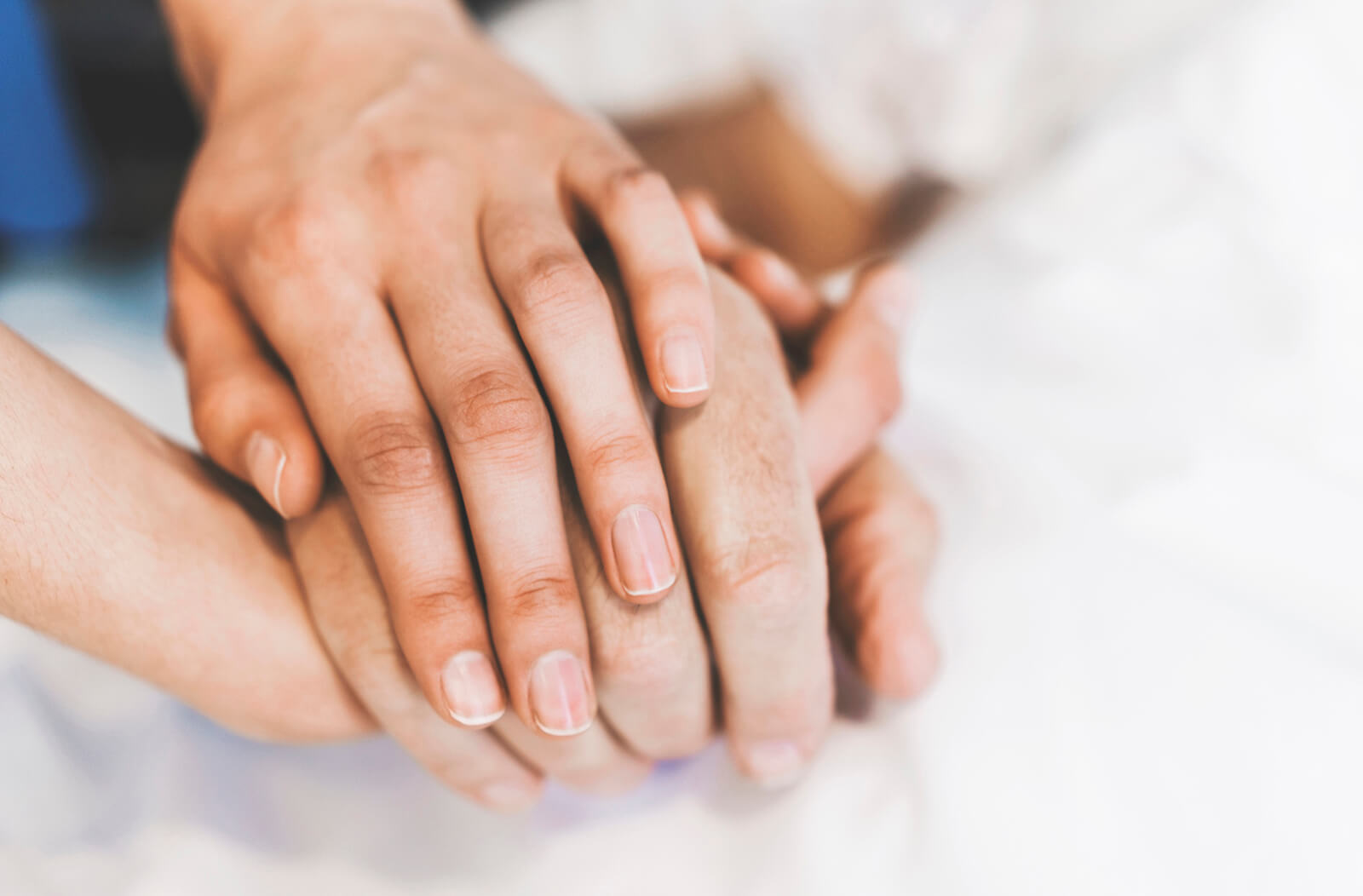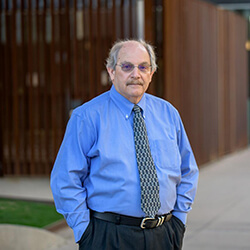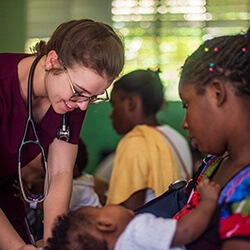
Medical Students Tackle Ethical Questions Raised by Pandemic

The COVID-19 pandemic has brought myriad health care issues to the forefront of public consciousness – access to affordable care, system capacity, public health surveillance and global health, to name a few. On an individual level, medical professionals are facing ethics questions every day, and some of the answers don’t come easy.
David Beyda, MD, chair of the Department of Bioethics and Medical Humanism at the University of Arizona College of Medicine – Phoenix, has spent his career wearing the dual hats of physician and ethicist. He said the circumstances during a pandemic cause some health care professionals to struggle with “duty of care,” the vocational obligation to help others.

Duty of care is one of a multitude of ethical issues Dr. Beyda raises with students through a robust ethics curriculum that includes 60 interactive lectures for first- and second-year medical students. Third- and fourth- year students continue to meet with Dr. Beyda to discuss actual cases and issues during clerkships and intercessions. Twice – in 2014 and 2018 – fourth-year students have honored Dr. Beyda with the Master Educator Award, the college’s top faculty award.
During each required lecture, Dr. Beyda introduces an ethical issue and then presents students with a hypothetical case study. Using Poll Everywhere, he asks questions: Do you agree? What would you do? After the anonymous answers are tallied, students discuss the results.
“It's been extremely interesting to see how sometimes there's conflict,” Dr. Beyda said, adding that when it comes to questions of ethics, there is no right or wrong answer. Many times, he said, ethical decisions are based on the perception of risk.
“When HIV and AIDS showed itself years and years ago, we did not know anything about it, and so we did not know what risks we were taking. That’s why some physicians said, I'm not going near those patients,” Dr. Beyda said, adding that much is still unknown about COVID-19, which can make the perception of risk higher for the medical community and the general public. “Until we learned that, you know what, we know what this is, we know how its transmitted – that's when everyone began to feel more comfortable, even the public. People began to feel more comfortable engaging with those who had HIV and AIDS, because they knew what the risks were.”
Discussions of risk permeate nearly every ethics lecture. In one class, Dr. Beyda asks students to imagine themselves in the role of family physician for a 66-year-old man who just retired from a blue-collar job he held from age 18. He's never taken a vacation. At his retirement, his wife, four children and grandchildren decide to take him on a two-week cruise. He opts to see his physician before he goes because he's been having some stomach issues and wants to make sure he can enjoy the cruise food. The physician examines him, feels something in his belly and orders a CAT scan. The day before the patient is supposed to leave for his cruise, the physician gets the results – life-limiting pancreatic cancer.
“Risk. Do you tell him before he goes on the cruise? Or do you wait till he comes back? Which one would you do? First, which one would you do in terms of duty to care for virtue, truth-telling, or duty to care for autonomy, letting him make his own decision? There's risk on both sides,” Dr. Beyda said. “These are the classic cases that I give the students that get them thinking. When I meet with them in the third and fourth year, they say, ‘Oh my gosh, we had a case just like that, and we now know how to think through it. We now know what we should be doing.’ I'm preparing them for that, and that's what that's been really successful.”

Dr. Beyda said in the nine years he has been using that case in his lectures, the results are consistent – half of the class says they would give the patient the diagnosis before the cruise; the other half say they would wait until after. “And they have reasons for both, and they're both valid,” he said.
Students learn how to think through ethical issues using curricula that centers around the “who” and the “what” – the person and the disease. Topics such as humility, virtue, kindness and gentleness are discussed and sometimes even practiced in one exercise many students find challenging at first.
Dr. Beyda’s ask is simple: hold someone’s hand. But the someone, in this case, is a patient in the intensive care unit who is on a ventilator and heavily sedated or comatose. It is an all-too-realistic example these days, as COVID-19 leaves many patients on ventilators and fighting for their lives.
“‘All I want you to do,’” Dr. Beyda tells his students, “‘is to hold their hand and to feel how vulnerable you are because that's all you're doing – and then also realize what a privilege it is to be able to do so.’ They realize that this is what medicine is all about. It's about being there and being present when present.”
Dr. Beyda gives back by assisting with ethical decisions when possible. Former students call him, sometimes several years after they’ve graduated, to talk through complicated ethics issues with him. He’s also currently serving on a pandemic ethics committee through the Arizona Department of Health Services. Doctors facing ethical decisions while dealing with COVID-19 can call the committee for guidance.
“I carry two hats – being a critical care physician, I have the experience and the knowledge to save a life, but as an ethicist, I have the experience and knowledge to ask the question, ‘Should I?’ Because there’s a big difference between keeping somebody alive and ensuring that they have a meaningful life after the hospital,” Dr. Beyda said. “I leave students with this often: Every decision you make has a consequence, and you live with it, and you own it, now and forever.”
Story by: Stacy Pigott
This story originally appeared on University of Arizona Health Sciences Connect.
About the College
Founded in 2007, the University of Arizona College of Medicine – Phoenix inspires and trains exemplary physicians, scientists and leaders to advance its core missions in education, research, clinical care and service to communities across Arizona. The college’s strength lies in our collaborations and partnerships with clinical affiliates, community organizations and industry sponsors. With our primary affiliate, Banner Health, we are recognized as the premier academic medical center in Phoenix. As an anchor institution of the Phoenix Bioscience Core, the college is home to signature research programs in neurosciences, cardiopulmonary diseases, immunology, informatics and metabolism. These focus areas uniquely position us to drive biomedical research and bolster economic development in the region.
As an urban institution with strong roots in rural and tribal health, the college has graduated more than 1,000 physicians and matriculates 130 students each year. Greater than 60% of matriculating students are from Arizona and many continue training at our GME sponsored residency programs, ultimately pursuing local academic and community-based opportunities. While our traditional four-year program continues to thrive, we will launch our recently approved accelerated three-year medical student curriculum with exclusive focus on primary care. This program is designed to further enhance workforce retention needs across Arizona.
The college has embarked on our strategic plan for 2025 to 2030. Learn more.